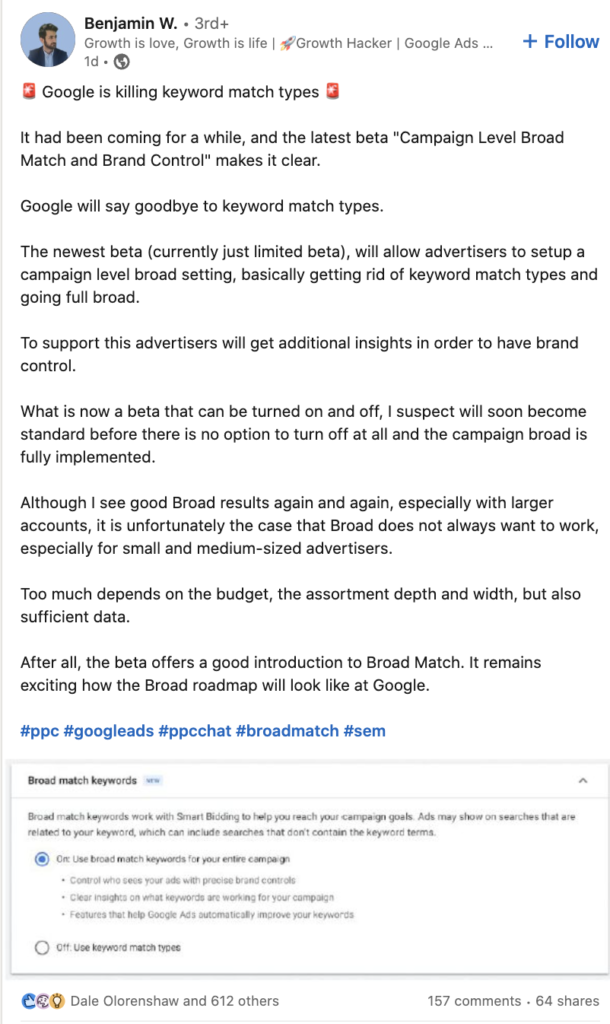Everything hinges on keyword targeting in paid search. To put it simply, you serve an ad based on what a user is searching for.
Brands spend a considerable portion of their marketing budget on paid search because of the ease of attribution and the visibility of results they see from it. It is arguably one of the most powerful ways of directly reaching users that are actively looking for something.
But keywords aren’t just simply uploaded. Keyword match types allow advertisers to specify how closely it wants Google to match a user’s search term to a specific keyword. For reference:
Exact match
You want to only serve an ad when a user searches for your exact specific keyword
(e.g. your keyword ‘red shoes’ would only serve for the search term ‘red shoes’)
Phrase match
You are willing to expand how your ad serves but the keyword has to appear in the phrase as exactly uploaded.
(e.g. your keyword ‘red shoes’ would serve for the search terms such as ‘female red shoes size 6’)
Broad match
You are willing to expand when your ad is served if Google feels as though your keyword relates to the user’s search intent.
(e.g. your keyword ‘red shoes’ would serve for the search terms such as ‘burgundy boots’)
Sounds pretty valuable, doesn’t it? It allows advertisers who offer unique services to be really targeted on who they’re reaching but also gives the flexibility for brands that are more focussed on raising awareness.
However, word on the grapevine is that this will soon be a thing of the past.
The PPC community has been whipped into a frenzy on LinkedIn over a recent post from Google Ads expert Benjamin W. who shared the news that Google is trialling campaign setups that allow users to run campaigns with just broad match types.

While this is currently in Beta, I don’t think it will be too long until we see this become the only option within paid search campaigns. This on top of the increasing amount of pressure to move to automated bidding and reduction of search term visibility could be the demise of the platform’s favorability with advertisers.
Google prides itself on being a marketing platform that gives its customers full control over how they spend their advertising budget but it feels as though this is quickly becoming a false claim.
Whilst the control may be running away from us, now is a really important time to get your paid search activity in order so that when the removal of match types comes, you can be as well prepared as possible.
Stay on top of search terms
Whilst you still have access, make sure that you are frequently mining your search query report to remove any terms that are irrelevant to your service/product offering.
The more of a solid negative keyword list you have now, the better prepared you’ll be when the move to broad match does come, by eradicating potentially huge volumes of wasted spend.
Review your ad copy
Does your ad copy truly reflect what you do? Does it align with the keywords you’re targeting? If not, then spend the time now crafting more relevant copy.
Not only should your ad copy attract people to click but it can also be used to qualify people out from clicking. For example, if you’re a luxury brand you want to be showcasing yourself as a more premium offering to avoid wasting spend on those looking for cheaper alternatives.
In addition, always make sure your ad copy mentions your ad group’s keywords in at least 1 pinned headline, description line and path. Doing so will support your overall ad rank score in the auction and put less pressure on you needing to set higher bid levels.
Evaluate your landing page
How confident are you that your landing page accurately represents your product or service offering? With Google taking into account the content of your landing page in assessing how highly you should rank in search results, it’s really important to make sure you’re ranking highly for the right types of terms and again avoiding the wrong types of users from clicking.
Test while you can
Before your keywords are moved over to broad match by default, test the use of them within your account first.
Start small, by focusing on a specific campaign or ad group to begin with so you can keep a handle on how things are performing. It’s important to remember that due to the nature of broad match, spend can get carried away quickly.
By testing groups of broad match terms, you’ll be able to assess the quality of traffic coming through and give the option to pause specific keywords earlier if you feel they’re not generating the right quality of traffic.
Assess your bid levels
With the volume of broad match terms being far greater than phrase and exact, now is a great time to assess how high your bid levels are currently set in the account.
It’s important that you don’t spend high on broad match terms that could be responsible for generating high volumes of irrelevant traffic.
Whilst the removal of phrase and exact match may seem like a daunting one, there are things you can start doing now to make sure you’re better positioned for the new broad match era.
Still, have questions and uncertainty about how to prepare your account? Get in touch with us today to speak to a member of our paid media team.


















